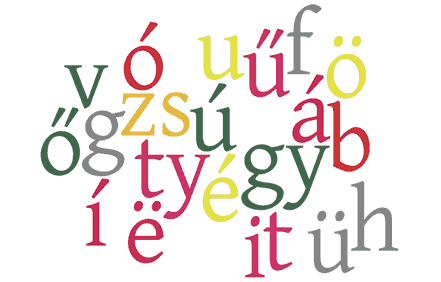Learn Hungarian
| English | Hungarian | |||
|---|---|---|---|---|
| Hello | Helló! | |||
| Hello | Jónapot! | |||
| Good evening | Jóestét! | |||
| Goodbye | Viszlát! | |||
| Goodbye | Viszontlátásra! | |||
| See you later | Később találkozunk | |||
| See you later | Akkor később találkozunk | |||
| Yes | Igen | |||
| No | Nem | |||
| Excuse me! | Elnézést | |||
| Thanks | Köszönöm | |||
| Thanks | Köszi | |||
| Thanks a lot | Köszönöm szépen! | |||
| Thanks a lot | Nagyon köszönöm! | |||
| Thank you for your help | Köszönöm a segítségét! | |||
| You’re welcome | Szívesen | |||
| Okay | Jó - Jól van – Oké | |||
| Okay | Rendben (van) | |||
| How much is it? | Elnézést, ez mennyibe kerül? | |||
| Sorry! | Bocsánat! | |||
| Sorry! | Bocsánatot kérek! | |||
| I don't understand | Nem értem | |||
| I get it | Értem | |||
| I don't know | Nem tudom | |||
| Forbidden | Tilos | |||
| Excuse me, where are the toilets? | Elnézést, hol van a WC? | |||
| Excuse me, where are the toilets? | Elnézést, hol van a mosdó? | |||
| Happy New Year! | B.ú.é.k! | |||
| Happy New Year! | Boldog új évet kívánok! | |||
| Happy Birthday! | Boldog születésnapot! | |||
| Happy Birthday! | Boldog szülinapot! | |||
| Happy Holidays! | Kellemes Ünnepeket! | |||
| Congratulations! | Gratulálok! | |||
| Congratulations! | Gratulálunk! |
Objectives Do you want to learn Hungarian to communicate more easily in everyday situations in Hungary? Loecsen offers a structured Hungarian course for beginners, designed to reach the skills expected at the CEFR A1 level. Words and sentences are chosen to match real situations, following a clear pedagogical progression. Learning relies on complete sentences, grammar explained through usage, precise pronunciation work, and modern tools to support memorization. With 5 to 15 minutes of practice per day, you can reach your first A1 language goal and gain autonomy from your very first exchanges in Hungarian.
Learn Hungarian online: a free course for complete beginners
Hungarian is often described as one of the most difficult European languages. This reputation usually comes from its grammar and its unfamiliar structure. In reality, Hungarian follows a very clear internal logic. Once this logic is understood, the language becomes surprisingly systematic and predictable.
Hungarian does not work by adding many small separate words. Instead, it builds meaning by adding information directly to the end of words. When learned through real everyday expressions, listening, and repetition, this system quickly becomes intuitive.
The Loecsen Hungarian course is a free online Hungarian course for beginners, designed for people starting from zero. It allows learners to begin understanding and using Hungarian from the very first lessons, without getting lost in abstract grammar.
The origins of Hungarian and why it feels different
Hungarian does not belong to the Indo-European language family. It is part of the Uralic language family, together with Finnish and Estonian. This explains why Hungarian feels fundamentally different from most other European languages.
Hungarian developed over centuries in the Carpathian Basin and came into contact with many neighboring cultures. These contacts influenced vocabulary, but the core grammatical structure remained intact. This is why Hungarian may feel unfamiliar at first, yet remains internally consistent once its logic is understood.
For beginners, the key is not to compare Hungarian to French, English, or German, but to understand how meaning is encoded directly inside words.
Understanding Hungarian grammar through real-life meaning
In Hungarian, grammatical information such as location or movement is expressed by modifying the noun itself. Instead of prepositions like “in”, “to”, or “from”, Hungarian uses endings that carry this information.
Before looking at the concrete examples we will use, We are going to clarify something. In Hungarian, two different words can refer to a place, even when both relate to “home”. One word is used to describe a physical place or building, while the other refers to the place where you live, in a personal and everyday sense.
Ház refers to a physical building, a concrete structure made of walls and rooms.
Otthon refers to home as a concept: the place where you live, belong, or feel at home. It is not about the building itself, but about your relationship to that place.
With a physical building, Hungarian uses ház:
- házban – in the house (inside the building)
- házba – into the house (movement into the building)
- házból – from the house (movement out of the building)
With the idea of “living environment”, Hungarian naturally uses otthon and related forms:
- Otthon vagyok. – I am at home
- Hazamegyek. – I am going home
- Otthonról jövök. – I am coming from home
The endings work in exactly the same way in both cases. The only difference is what the base word represents: a physical place or a personal reference point.
This is why learning Hungarian through complete everyday expressions is so effective. Learners encounter the correct word in the correct context from the start, without having to memorize rules.
Why Hungarian is simpler than it looks
Despite its reputation, Hungarian removes several difficulties that learners often expect:
- No grammatical gender – nouns are neither masculine nor feminine.
- No gender-based agreement for adjectives or articles.
- Very regular pronunciation – words are pronounced exactly as they are written.
This means that once you know how a word is written, you already know how to pronounce it.
Meaning is carried mainly by endings, not by strict word order. This gives Hungarian a lot of flexibility while remaining precise.
In everyday communication, sentences are often short and direct:
Értem. – I understand.
Nem értem. – I don’t understand.
Szeretném ezt. – I would like this.
Because grammatical roles are encoded inside the words themselves, Hungarian allows speakers to change word order for emphasis without losing clarity.
A practical and effective learning routine with Loecsen
Learning Hungarian works best with short, regular practice sessions and repeated exposure to the same expressions.
- Practice every day, even just a few minutes.
- Listen carefully and repeat sentences out loud.
- Reuse familiar expressions in different situations.
- Accept approximation and focus on understanding.
- Let repetition do the work instead of memorizing rules.
- Use Listening mode to adapt your ear to Hungarian sounds.
- Practice with AI dialogues to simulate real situations without pressure.
- Rely on Spaced Repetition (SRS) and Super Memory to review expressions at the right moment.
Staying motivated while learning Hungarian
Feeling disoriented at the beginning is normal, especially with a language that works differently.
- Reduce your daily goal instead of stopping.
- Return to expressions you already understand.
- Switch to listening only on low-energy days.
- Accept gradual progress as part of the process.
Consistency matters more than intensity when learning Hungarian.
How the Loecsen course supports beginners
The Loecsen Hungarian course is a free online Hungarian course designed specifically for complete beginners.
It focuses on essential everyday expressions, reinforced through listening, repetition, and contextual explanations.
Thanks to its structured progression and Spaced Repetition System (SRS), learners progressively reach a functional CEFR A1 level.
This course is suitable for self-learners using an app, a browser, or a mobile device.
Frequently asked questions about learning Hungarian
Is Hungarian really difficult for beginners?
Hungarian feels unfamiliar at first, but its internal logic is very consistent. Once patterns are recognized, progress becomes much easier.
Can I learn Hungarian online for free?
Yes. By following a structured free online Hungarian course like Loecsen, you can start from zero and learn independently.
How long does it take to start understanding Hungarian?
With regular practice, most learners begin to understand and use basic Hungarian expressions within a few weeks.
Course syllabus – What you’ll learn
- Essentials 3-5H • 64-96D • 25-38 sessions
- Conversation 3-5H • 64-96D • 25-38 sessions
- Learning 1-2H • 61-92D • 10-15 sessions
- Colours 1-2H • 61-92D • 10-15 sessions
View all lessons (17)
- Numbers 4-6H • 67-101D • 40-60 sessions
- Time tracking 3-5H • 64-96D • 25-38 sessions
- Taxi 2-3H • 62-93D • 15-23 sessions
- Family 2-3H • 62-93D • 15-23 sessions
- Feelings 2-3H • 63-95D • 20-30 sessions
- Bar 3-5H • 64-96D • 25-38 sessions
- Restaurant 3-5H • 65-98D • 30-45 sessions
- Parting 2-3H • 62-93D • 15-23 sessions
- Transportation 0-0H • 59-89D • 0-0 sessions
- Hotel 3-5H • 65-98D • 30-45 sessions
- Looking for someone 1-2H • 61-92D • 10-15 sessions
- Beach 3-5H • 65-98D • 30-45 sessions
- In case of trouble 2-3H • 63-95D • 20-30 sessions






